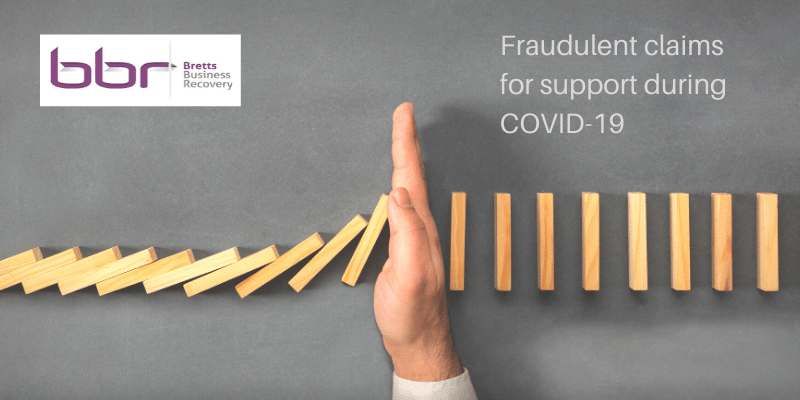Entering insolvency despite Government funding – could your claim for funding be deemed fraudulent?

Claims for financial support may be deemed fraudulent if the company was already in trouble when making claims and then later enters into an insolvency process.
Insolvency practitioners (IPs) have been advised to remain alert to potentially fraudulent activity when dealing with directors of a company that is considering an insolvency solution despite having received Government COVID-19 support.
COVID-19 support can create additional funds which then remain as ‘cash’ held in a business and could then be used to fund an insolvency procedure and adversely benefit directors and shareholders. Whilst there are moral and ethical arguments against the use of these funds for this purpose, IPs are also required to consider any illegal or fraudulent activity that may have taken place.
The technical explanations around this are very detailed and complex – we’ve tried to summarise key points here for your reference, however, if you are in any doubt about making claims for support and how this affects your position, please speak to an Insolvency Practitioner.
Business finance measures that might result in additional cash held in the business on insolvency may come from claims for support in:
- Grants
- Furlough payments
- Loans
- Deferred VAT
Ultimately, the result of a successful claim is that the claimant company receives or maintains cash in the business. Each of these support measures have their own tests for eligibility which must be met by companies. By way of example, we examine grant funds further.
Grants such as:
- Small Business Grant Fund (SBGF) – eligible for a payment of £10,000.
- Retail, Hospitality and Leisure Grant – the local authority pays between £10,000 and £25,000 per property based on the rateable value of the business property.
To be eligible for these grants, a business had to be in occupation of the rateable property on 11 March 2020 and should not have been an “undertaking in difficulty” on 31 December 2019.
Should a business make successful claims for grants and then subsequently enter an insolvency process regardless, the key point in these cases will be in identifying whether the business could be seen to be in difficulty prior to making the claim. There are a number of tests for this which, whilst too intricate to detail, essentially relate to the business shareholdings and debt ratios at the time of claim.
It’s likely, in this environment, that many businesses seeking a formal insolvency solution today may have been in financial difficulty for some time. If the business was already in trouble in December 2019, but the directors declared that it was not, the grant may have been obtained fraudulently. The additional funds received would then become proceeds of crime and subject to the Anti Money Laundering legislation.
An IP would have to consider whether the funds were correctly and reasonably obtained.
Compliance guidance does, however, acknowledge that it is quite possible in these extreme circumstances, that a previously viable business has suffered such a catastrophic failure that it cannot continue. The decision for IPs therefore becomes more subjective.
Ever-changing messages about restrictions and government support are compounding the economic and global uncertainty. In reality, assumptions cannot easily be made about the viability of a company in this environment and therefore it is likely that in most cases it will be very difficult to show that a director was fraudulent in applying for loan or grant funding.
For advice on your business recovery options, please contact us.